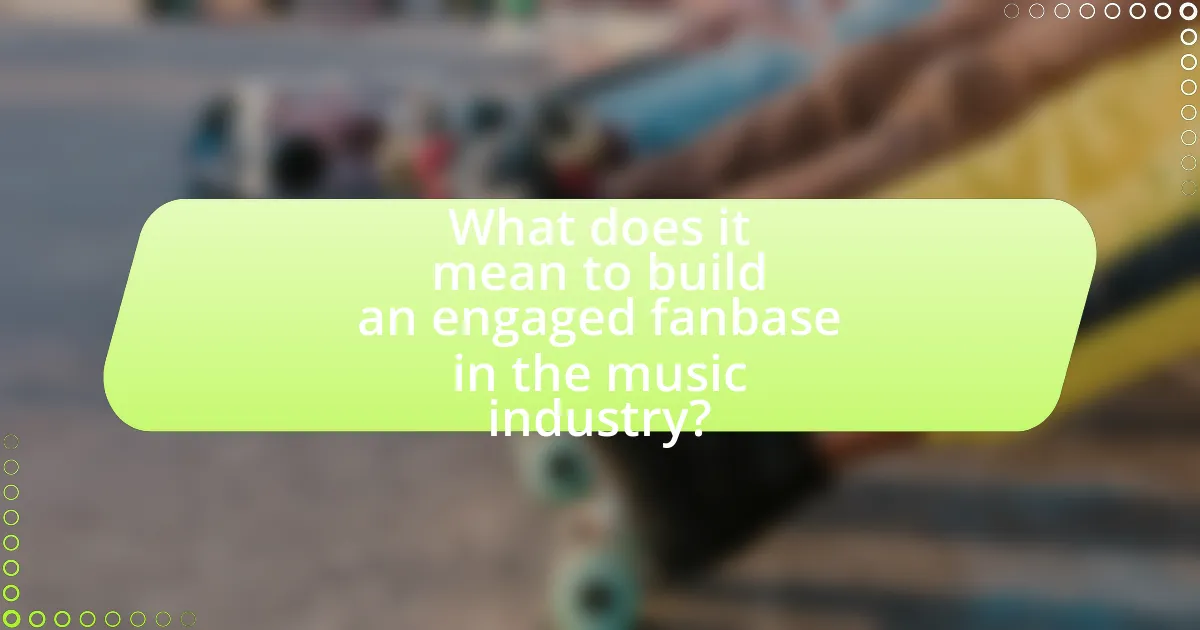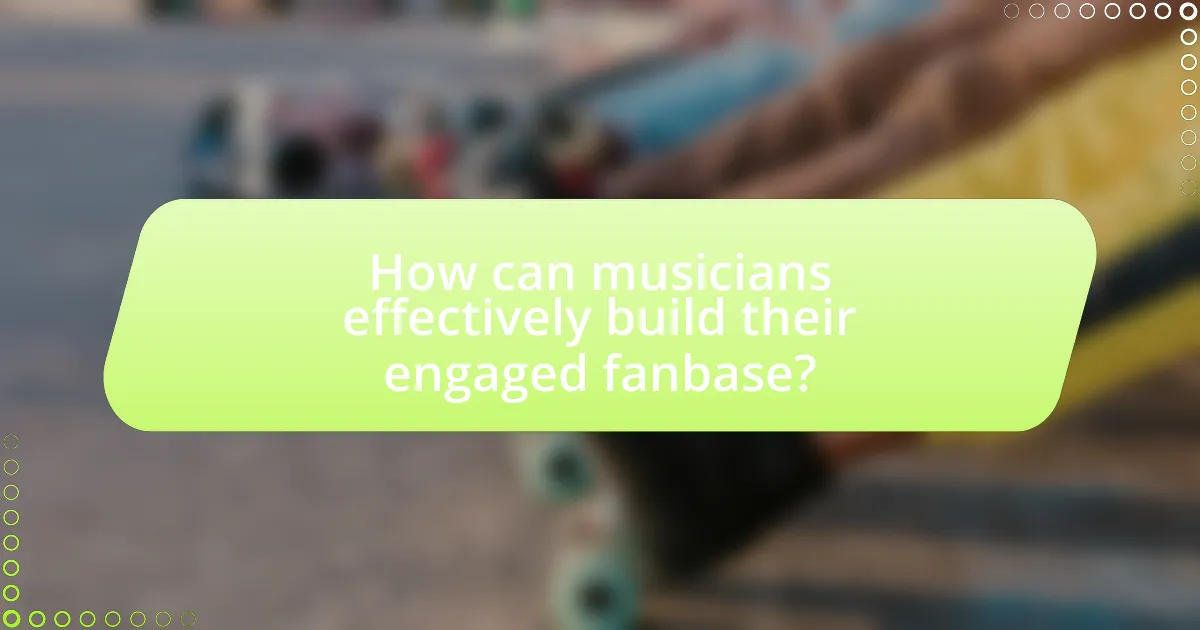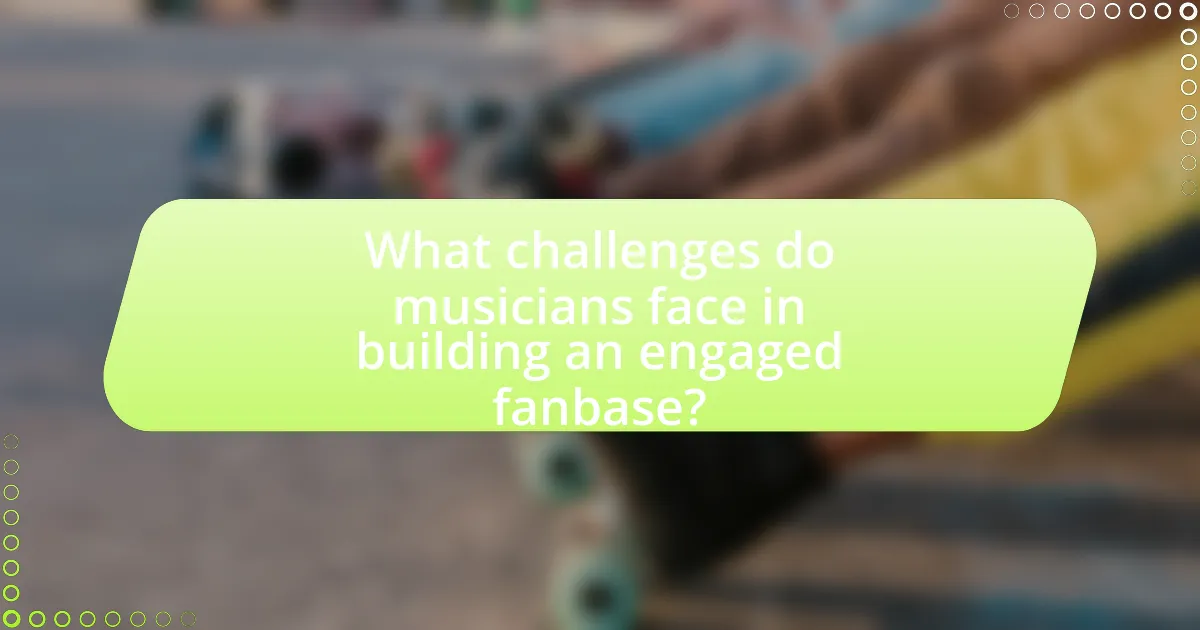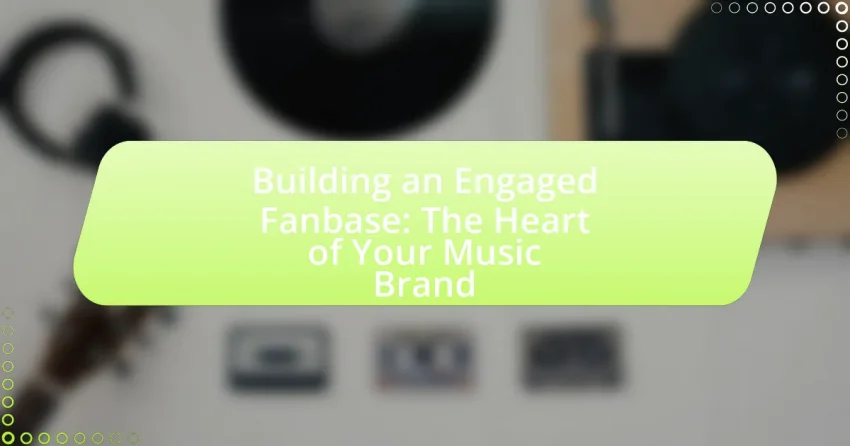Building an engaged fanbase is essential for success in the music industry, as it fosters loyalty, drives revenue, and enhances brand visibility. An engaged fanbase is characterized by strong emotional connections, active participation, and consistent interaction with artists, leading to increased streaming numbers and concert attendance. The article explores the significance of fan engagement, effective strategies for building and maintaining a dedicated following, and the challenges musicians face in achieving visibility and connection with their audience. Key metrics for assessing engagement and the role of authenticity and consistency in branding are also discussed, providing a comprehensive overview of how artists can cultivate a loyal community of supporters.

What does it mean to build an engaged fanbase in the music industry?
Building an engaged fanbase in the music industry means creating a loyal and interactive community of listeners who actively support an artist’s work. This engagement is characterized by fans participating in discussions, sharing content, attending live events, and contributing to the artist’s success through word-of-mouth promotion. Research indicates that artists with engaged fanbases experience higher streaming numbers and ticket sales, as evidenced by a 2021 study from the Music Industry Research Association, which found that artists with strong social media interactions saw a 30% increase in concert attendance.
Why is an engaged fanbase crucial for a music brand?
An engaged fanbase is crucial for a music brand because it drives loyalty, increases revenue, and enhances brand visibility. When fans actively participate, they are more likely to attend concerts, purchase merchandise, and share content, which directly contributes to the financial success of the brand. For instance, a study by Nielsen Music found that 70% of fans are willing to spend more on artists they are engaged with, highlighting the economic impact of fan engagement. Additionally, engaged fans often act as brand ambassadors, promoting the music through word-of-mouth and social media, which amplifies the brand’s reach and influence in the industry.
How does an engaged fanbase impact a musician’s career?
An engaged fanbase significantly enhances a musician’s career by providing consistent support, increasing visibility, and driving revenue. When fans actively participate in a musician’s journey, they contribute to higher streaming numbers, ticket sales, and merchandise purchases, which are crucial for financial success. For instance, artists like Taylor Swift have leveraged their dedicated fanbase to achieve record-breaking album sales and sold-out tours, demonstrating the direct correlation between fan engagement and commercial success. Furthermore, an engaged fanbase often leads to organic marketing through word-of-mouth, social media sharing, and fan-generated content, amplifying the musician’s reach and influence in the industry.
What role does fan engagement play in music marketing?
Fan engagement is crucial in music marketing as it fosters a loyal community that drives an artist’s success. Engaged fans are more likely to share music, attend concerts, and purchase merchandise, which directly impacts revenue and visibility. For instance, a study by Nielsen Music found that 70% of fans are more likely to support an artist financially if they feel a personal connection. This connection enhances word-of-mouth promotion, amplifying the artist’s reach and influence in the industry.
What are the key characteristics of an engaged fanbase?
An engaged fanbase is characterized by strong emotional connections, active participation, and consistent interaction with the brand or artist. These fans demonstrate loyalty through regular attendance at events, sharing content on social media, and engaging in discussions about the music. Research indicates that engaged fans are more likely to purchase merchandise and support crowdfunding initiatives, as seen in a study by the Music Industry Research Association, which found that 70% of engaged fans contribute to artists financially. Additionally, they often provide valuable feedback, helping to shape the artist’s direction and offerings.
How do emotional connections influence fan engagement?
Emotional connections significantly enhance fan engagement by fostering loyalty and creating a sense of belonging among fans. When fans feel emotionally connected to an artist or brand, they are more likely to participate in activities such as attending concerts, sharing content on social media, and purchasing merchandise. Research indicates that emotional engagement can lead to a 23% increase in customer loyalty, as demonstrated in a study by Gallup, which highlights the importance of emotional ties in driving consumer behavior. This connection transforms passive listeners into active participants, ultimately strengthening the overall fanbase and enhancing the brand’s presence in the music industry.
What behaviors define an engaged music fan?
Engaged music fans exhibit behaviors such as actively attending concerts, sharing music on social media, and participating in fan communities. These actions demonstrate their commitment and enthusiasm for the music and the artists they support. For instance, a study by Nielsen Music found that 70% of fans who attend live shows are more likely to purchase merchandise, indicating a strong connection to the artist. Additionally, engaged fans often create and share playlists, which fosters a sense of community and promotes the artist’s work further.

How can musicians effectively build their engaged fanbase?
Musicians can effectively build their engaged fanbase by consistently creating high-quality content and actively interacting with their audience. Engaging with fans through social media platforms, live performances, and personalized communication fosters a sense of community and loyalty. According to a 2021 study by the International Music Summit, artists who engage with their fans on social media see a 30% increase in fan retention and interaction. This demonstrates that direct communication and authentic engagement are crucial for cultivating a dedicated fanbase.
What strategies can be employed to attract fans?
To attract fans, artists can employ strategies such as leveraging social media platforms, engaging in live performances, and collaborating with other musicians. Social media platforms like Instagram and TikTok allow artists to showcase their music and connect with potential fans through interactive content, which has been shown to increase fan engagement significantly. Live performances create memorable experiences that foster a deeper connection with the audience, as evidenced by the fact that 70% of concertgoers report feeling more connected to artists after attending a live show. Collaborating with other musicians can also expand an artist’s reach, as partnerships often introduce their music to new audiences, enhancing visibility and fan acquisition.
How can social media be leveraged for fan engagement?
Social media can be leveraged for fan engagement by creating interactive content that encourages participation and fosters community. Platforms like Instagram and Twitter allow artists to share behind-the-scenes content, conduct live Q&A sessions, and host polls, which directly involve fans in the creative process. For instance, a study by the Pew Research Center found that 69% of adults in the U.S. use social media, indicating a vast audience that can be reached for engagement purposes. Additionally, utilizing user-generated content, such as fan art or cover challenges, can enhance the sense of belonging among fans, as evidenced by successful campaigns from artists like Taylor Swift, who actively engages her fanbase through social media interactions.
What role does live performance play in building a fanbase?
Live performance is crucial in building a fanbase as it creates direct, personal connections between artists and their audience. These interactions foster loyalty and emotional investment, which are essential for fan engagement. According to a study by the University of Southern California, 70% of concertgoers reported feeling a stronger connection to artists after attending live shows, highlighting the impact of shared experiences. Additionally, live performances often lead to increased merchandise sales and social media engagement, further solidifying the artist’s presence in fans’ lives.
How can musicians maintain and nurture their fanbase?
Musicians can maintain and nurture their fanbase by consistently engaging with their audience through social media, live performances, and personalized communication. Regularly posting updates, behind-the-scenes content, and responding to fan interactions on platforms like Instagram and Twitter fosters a sense of community. Additionally, hosting live shows and virtual events allows musicians to connect with fans in real-time, enhancing loyalty. Research indicates that artists who actively engage with their fans see a 30% increase in fan retention rates, demonstrating the effectiveness of these strategies in building a dedicated following.
What are effective communication methods with fans?
Effective communication methods with fans include social media engagement, email newsletters, and live interactions. Social media platforms like Instagram and Twitter allow for real-time interaction, fostering a sense of community and immediacy. Email newsletters provide a direct line of communication, allowing artists to share exclusive content and updates, which can increase fan loyalty. Live interactions, such as concerts or Q&A sessions, create personal connections and enhance fan experience. According to a 2021 survey by Eventbrite, 78% of fans prefer to engage with artists through social media, highlighting its effectiveness as a communication method.
How can exclusive content enhance fan loyalty?
Exclusive content enhances fan loyalty by providing unique experiences that deepen the emotional connection between fans and the brand. When fans access exclusive materials, such as behind-the-scenes footage, early releases, or special merchandise, they feel valued and part of an inner circle. This sense of belonging fosters a stronger attachment to the brand, as evidenced by a study from the Journal of Marketing Research, which found that consumers who engage with exclusive content are 60% more likely to remain loyal to a brand over time. By consistently offering exclusive content, brands can cultivate a dedicated fanbase that actively supports and promotes their work.

What challenges do musicians face in building an engaged fanbase?
Musicians face several challenges in building an engaged fanbase, including competition, visibility, and audience connection. The music industry is saturated, with over 60,000 new tracks uploaded to streaming platforms daily, making it difficult for individual artists to stand out. Additionally, musicians often struggle with effectively utilizing social media and digital marketing strategies to reach potential fans, as 70% of musicians report feeling overwhelmed by the demands of online promotion. Furthermore, establishing a genuine connection with fans can be challenging, as artists must navigate the balance between personal authenticity and professional branding to foster loyalty and engagement.
What common obstacles hinder fan engagement?
Common obstacles that hinder fan engagement include lack of communication, insufficient content variety, and failure to understand audience preferences. Lack of communication can lead to fans feeling disconnected from the brand, as they may not receive updates or feel involved in the community. Insufficient content variety can result in boredom, as fans may lose interest if the content does not cater to diverse tastes. Additionally, failure to understand audience preferences can create a disconnect, as brands may produce content that does not resonate with their fanbase. According to a study by the Harvard Business Review, companies that actively engage with their audience see a 20% increase in customer satisfaction, highlighting the importance of addressing these obstacles.
How can musicians overcome the challenge of visibility?
Musicians can overcome the challenge of visibility by leveraging social media platforms to engage with their audience directly. Utilizing platforms like Instagram, TikTok, and YouTube allows musicians to showcase their talent, share behind-the-scenes content, and interact with fans, which can significantly increase their reach. According to a 2021 report by the International Federation of the Phonographic Industry, 70% of music consumers discover new artists through social media, highlighting its effectiveness in enhancing visibility. Additionally, collaborating with other artists and influencers can further amplify their presence, as partnerships often introduce musicians to new audiences.
What strategies can address fan retention issues?
To address fan retention issues, implementing personalized communication strategies is essential. Personalized emails, targeted social media content, and exclusive offers tailored to individual fan preferences can significantly enhance engagement. Research indicates that brands utilizing personalized marketing see a 20% increase in customer satisfaction and loyalty. Additionally, creating a community through fan clubs or exclusive events fosters a sense of belonging, which is crucial for retaining fans. According to a study by the Harvard Business Review, engaged customers are 23% more likely to share their positive experiences, further solidifying their loyalty.
How can musicians measure the success of their fan engagement efforts?
Musicians can measure the success of their fan engagement efforts through metrics such as social media interactions, email open rates, and concert attendance. Social media platforms provide analytics that track likes, shares, and comments, indicating how well content resonates with fans. For example, a study by Hootsuite found that posts with higher engagement rates correlate with increased fan loyalty. Additionally, monitoring email open rates can reveal how effectively musicians communicate with their audience; a 20% open rate is considered average in the music industry. Lastly, concert attendance figures serve as a direct measure of fan engagement, with sold-out shows reflecting strong fan support and connection.
What metrics are important for assessing fan engagement?
Key metrics for assessing fan engagement include social media interactions, attendance at events, merchandise sales, and email open rates. Social media interactions, such as likes, shares, and comments, provide insight into how fans are connecting with content. Attendance at events reflects the level of commitment and interest from fans, while merchandise sales indicate financial support and brand loyalty. Email open rates measure the effectiveness of communication strategies and fan interest in updates. These metrics collectively offer a comprehensive view of fan engagement levels and behaviors.
How can feedback from fans inform future engagement strategies?
Feedback from fans can significantly inform future engagement strategies by providing insights into their preferences and behaviors. Analyzing fan feedback, such as comments on social media, survey responses, and attendance at events, allows brands to identify what resonates with their audience. For instance, a study by Nielsen Music found that 70% of fans are more likely to engage with artists who actively listen to their feedback. This data underscores the importance of incorporating fan input into decision-making processes, enabling brands to tailor their content, marketing efforts, and event planning to better meet fan expectations and enhance overall engagement.
What are some best practices for building an engaged fanbase?
To build an engaged fanbase, consistently create high-quality content that resonates with your audience. Engaging with fans through social media platforms, responding to comments, and hosting live events fosters a sense of community. Research indicates that artists who interact regularly with their fans see a 30% increase in fan loyalty and engagement. Additionally, offering exclusive content or experiences, such as behind-the-scenes access or early ticket sales, can significantly enhance fan investment in your brand.
How can consistency in branding enhance fan engagement?
Consistency in branding enhances fan engagement by creating a recognizable and trustworthy identity that resonates with fans. When a brand maintains uniformity in its messaging, visuals, and overall experience, it fosters familiarity, which can lead to increased loyalty and emotional connection among fans. Research indicates that brands with consistent presentation across all platforms can see a revenue increase of up to 23%, highlighting the financial benefits of strong brand consistency. This familiarity encourages fans to engage more actively, as they feel a deeper connection to a brand that consistently reflects its values and promises.
What role does authenticity play in connecting with fans?
Authenticity is crucial in connecting with fans as it fosters trust and loyalty. When artists present their true selves, fans feel a genuine connection, which enhances emotional engagement. Research indicates that 86% of consumers value authenticity in brands, suggesting that this principle applies equally to music artists. By sharing personal stories and experiences, artists create relatable content that resonates with their audience, reinforcing the bond between them. This connection is further supported by the fact that fans are more likely to support and promote artists who they perceive as authentic, leading to a more engaged and dedicated fanbase.
